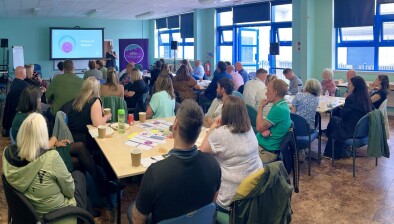Glasgow reduces street homelessness as part of first international initiative
Heriot-Watt University has published the results of the first international initiative to end street homelessness which revealed Glasgow’s success in reducing the number of people experiencing homelessness living on the streets of the city.

In Glasgow, evidence suggests that fewer than 7 people were sleeping rough in the city centre at any one time at the end of the initiative’s target period, a reduction of 75% on baseline figures.
The initiative has revealed the key ingredients for success along with common systemic barriers, including an overreliance on charity and faith groups for service delivery in some cities around the world.
Greater Manchester and Sydney (Australia) also achieved significant success in meeting self-imposed targets to reduce street homelessness.
The Institute of Global Homelessness’ (IGH) A Place to Call Home initiative, launched in 2017, is the first concerted effort to support cities across the globe to eradicate street homelessness.
An initial cohort of 13 ‘Vanguard Cities’ committed to a target of either ending or reducing street homelessness by December 2020, with over half (Adelaide, Glasgow, Greater Manchester, Montevideo, Santiago, Sydney and Tshwane) achieving reductions.
Greater Manchester set the most ambitious target, to end all street homelessness by December 2020, and achieved an impressive 52% reduction against baseline, the largest reduction in absolute numbers on the streets. Sydney reduced all street homelessness in the city by 25% by December 2020.
COVID initiatives, including the ‘Everyone In’ approach in the UK, helped to accelerate success and demonstrate what can be achieved with sufficient political will.
The independent evaluation of the initiative, funded by Oak Foundation and delivered by Heriot-Watt University in partnership with the GISS institute in Bremen, Germany, monitored progress towards the numerical goals set by each city and, crucially, drew out the core components of successful interventions that can now be transferred to other locations.
Key to the success achieved by several cities was the presence of a lead agency driving efforts. The study also found that coordinated entry to homelessness services which identified, profiled and tracked the people affected, coupled with investment in specialised and evidence-based interventions, were most beneficial. These included assertive street outreach services, individual case management and the Housing First approach.
However, the initiative found common barriers to progress across multiple countries and cities including a lack of preventative interventions to tackle street homelessness, pressure on affordable housing and insufficient resources, especially in Global South cities.
An overreliance on undignified and, at times, unsafe communal shelters represented an approach limited to ‘managing’ rather than reducing street homelessness. With many local and national governments failing to take responsibility for the systemic changes needed to protect vulnerable people, there was often a dependence on voluntary and faith groups for the provision of crisis services. However, the direct involvement of some religious denominations was found to discourage access for some people, while adding to the conditions attached for those seeking support.
Aggressive enforcement interventions by some police and city authorities, especially in North America and the Global South, and documentary and identification barriers, were also found to be counter-productive to attempts to reduce street homelessness.
Professor Suzanne Fitzpatrick, director of I-SPHERE at Heriot-Watt University led the international research team. She said: “Street homelessness is one of the most extreme and visible manifestations of profound injustice that our society faces today. Yet, it often struggles to achieve sufficient attention at an international level.
“While there are clear country-specific challenges that need to be overcome, this first global initiative on tackling street homelessness has highlighted the need to move way from a one-size-fits-all approach, towards more specialised interventions that target specific subgroups. Appropriate services for women, children, older people and other vulnerable groups, as well as culturally sensitive responses to Indigenous people and other groups affected by racial and associated forms of prejudice are essential.
“The overwhelming emphasis on emergency interventions was clear in our findings, with support applied only when people are already in crisis, rather than placing greater focus on preventative models. Even predictable pathways into street homelessness from institutions like prisons and hospitals have seldom attracted concerted prevention efforts and this needs to be urgently addressed.”
The pandemic prompted better coordination of local efforts to address street homelessness in many cities, but the impact of the crisis differed markedly across the Vanguard Cities. People at risk of street homelessness were most effectively protected in the UK and Australian cities[3].
Responses were less inclusive and ambitious in the North American and Global South cities, with more continued use of ‘shared air’ shelters.
Susanne Millar, chief officer, Glasgow City Health & Social Care Partnership, said: “Glasgow is delighted to be a member of the Vanguard City collaborative and very much welcome the findings of this report. Collaboration remains at the heart of our approach to tackling what is a highly complex social issue. Glasgow and our wider partners continually strive to improve our response to addressing the significant impact homelessness can have on individuals.
“We have made clear that nobody needs to sleep on the streets in Glasgow. We are helping the most vulnerable citizens rebuild their lives through our Housing First approach and the experience gained from managing a world-wide global pandemic has been instrumental in shaping new ways of working which focus on complexity and risk rather than homelessness status alone.
“We have worked closely with Homeless Network Scotland and are keen to continue participating in this international initiative and forge closer partnerships with other cities to share ideas, exchange evidence and identify best practice.”







